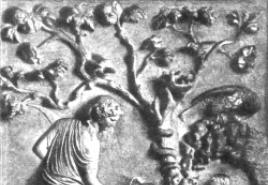The river is dead. Styx, oceanid, goddess of the river of the dead
Styx- a river in the kingdom of the dead, through which, according to legend, the souls of the dead are transported by Charon. Sometimes it is described as a lake or swamp, as, for example, in Aristophanes' comedy "Frogs". Homer has the most terrible oath of the gods - to swear in the name of Styx. In another legend, Achilles was immersed in the Styx to make him invulnerable. Herodotus wrote about the existence of a stream in Arcadia, falling vertically from a cliff: its waters are cold as ice and leave a black mark on the stones. It was believed that these were the waters of the Styx.
Experts from Stanford University are confident that the river, which, according to legend, flowed from the Underworld, still exists in the mountainous part of the Peloponnese peninsula, but is now known as Mavroneri.
The scientists' arguments are based on the assumption that Alexander the Great was poisoned with water taken from the Styx. The results of the analysis of the Mavroneri waters indicate that it contains microorganisms that are fatally poisonous to humans, poisoning with which is accompanied by symptoms from which the great commander suffered before his death. It is curious that even in ancient times they thought that the waters of the Styx were poisonous. Arrian Flavius and Plutarch report that Alexander the Great was poisoned by water from the Styx sent to him in the hoof of a mule, although Pausanias does not mention this fact.
Styx river in Hades.
Hephaestus, when forging the sword of Dawn, tempered it in the waters of the Styx. According to Hesiod, the River Styx constituted a tenth of the entire stream that penetrated through the darkness into the underworld, where Cocytus flowed into the Styx; the remaining nine parts of the stream surrounded the earth and sea with their windings. Poets also mention the Stygian swamps in Hades.
According to one of the ancient legends, the famous hero Achilles received his invincibility thanks to the fact that his mother, the goddess Thetis, dipped him into the waters of the sacred Styx.
In historical times, the River Styx was seen in a stream near Nonacris, and it was said that Alexander the Great was poisoned with this water.
According to the myths of ancient Greece, there were countries on the globe where eternal night reigned and the sun never rose over them. In such a country, the ancient Greeks placed the entrance to Tartarus - the underground kingdom of the god Hades, the kingdom of the dead of Greek mythology. The kingdom of the god Hades was watered by two rivers: Acheron And Styx. The gods swore in the name of the River Styx, pronouncing oaths. Oaths by the River Styx were considered inviolable and terrible.
To understand the history of the mysterious River Styx, you should plunge a little into mythology. So, in ancient mythical times, the world was divided between the gods into three parts. The dungeon was in the power of the dark god Hades, and the gloomy old man Charon transported dead souls across the Styx. The river flowed in the underground kingdom, the entrance to which was guarded by the three-headed Cerberus, on whose neck poisonous snakes curled.
During the funeral rite, a coin was placed in the mouth of the deceased as a tribute to the god of the underground. It was believed that a soul that did not offer payment would be doomed to wander forever along the banks of the Styx. The power of Hades was very great. And despite the fact that his brother Zeus was of higher rank, the god of the underworld possessed enormous power. The laws in his domain were inflexible. And order in the kingdom is indestructible and strong, so the gods swore by the waters of the sacred river Styx. Not a single god could rescue anyone who fell into the underworld: Charon melted them down to the kingdom of the dead, but never back to where the sun shines.
The River Styx is poisonous, but also capable of granting immortality. The expression Achilles' heel is directly related to this river. Achilles' mother Thetis dipped her son in the waters of the Styx, thanks to which the hero became invincible. And only the heel by which his mother held him remained vulnerable.

And the ancient Greek poet Hesiod wrote that the River Styx represented a tenth of the groundwater. The remaining waters spread over the earth and surrounded the seas. However, the beginning and end of the Styx are unknown. This is the river of death, a treacherous river. Its direction and location are constantly changing. But at the same time, the road along the river never lasts longer than a day.
It is also believed that the River Styx kills all living things. This is water, cold as ice and corroding everything in its path. Anyone who drinks from it or touches this water will die. Glass, clay, crystal products all burst when they fall into the waters of this river. All metals are corroded by the water of the Styx. But everything with divine power also has a weak point. Like vinegar eats away pearls or like goat's blood dissolves a diamond. According to one version, the water of the Styx cannot corrode only a horse’s hoof.
In addition, in ancient times it was considered the most terrible punishment to be cursed by the waters of the Styx. And no matter how many interpretations there are, one thing is invariably a poisonous and dangerous river that flows underground and symbolizes primitive fear and darkness.
In ancient times, it was thought that its waters were poisonous. Arrian Flavius and Plutarchus report that Alexander the Great was poisoned by water from the Styx sent to him in the hoof of a mule, although Pausanias does not mention this fact. In the composition, the hero, together with Charon, crosses the River Styx to the kingdom of the dead. the shore of the living is full of light, and on the shore of the dead the hero sees centaurs, dragons, harpies, birds with female heads and other monsters of the underworld..
Sources: www.grekomania.ru, world-of-legends.su, zaumnik.ru, fb.ru, otvet.mail.ru
Arachne - daughter of Idmon
Saint Joseph in Egypt
Hel - the kingdom of the dead
Helios - sun god
Results of collectivization in the USSR

The first attempts at collectivization were made by the Soviet government immediately after the revolution. However, at that time there were many more serious problems. ...
Medieval philosophy

Medieval philosophy is the philosophy of feudal society, developing in the era from the Roman Empire to the emergence of the early forms of capitalist society School, ...
Design stages in business activities

One of the most important principles of economic activity is planning. This is a prerequisite for success when it comes to long-term tasks. Therefore on...
Submarines Yasen

Firstly, it is low noise. Secondly, there are vertical take-off cruise missiles. Thirdly, there is a powerful hydroacoustic system, with an antenna that occupies the entire bow. There...
Aircraft carrier Admiral Kuznetsov

The heavy aircraft-carrying cruiser Admiral Kuznetsov is accompanied by the nuclear-powered cruiser Peter the Great and several auxiliary ships. Publications in the UK noted that the passage of Russian ships...
To understand the history of the mysterious River Styx, you should plunge a little into mythology. So, in ancient mythical times, the world was divided between the gods (Zeus, Hades and Poseidon) into three parts. The dungeon was dominated by the dark and the gloomy old man Charon transported dead souls across the Styx. The river flowed in the underground kingdom, the entrance to which was guarded by the three-headed Cerberus, on whose neck curled
During the funeral rite, a coin was placed in the mouth of the deceased as a tribute to the god of the underground. It was believed that a soul that did not offer payment would be doomed to wander forever along the banks of the Styx. The power of Hades was very great. And despite the fact that his brother Zeus was of higher rank, the god of the underworld possessed enormous power. The laws in his domain were inflexible. And order in the kingdom is indestructible and strong, so the gods swore by the waters of the sacred river Styx. Neither could pull out anyone who fell into the underworld: Charon melted them into the kingdom of the dead, but never back to where the sun shines.
The River Styx is poisonous, but also capable of granting immortality. The expression “Achilles' heel” is directly related to this river. Achilles' mother Thetis dipped her son in the waters of the Styx, thanks to which the hero became invincible. And only the “heel” by which his mother held him remained vulnerable.

In reality it does not exist. Except that in Perm this is the name given to one of the rivers that separates the city from the cemetery.
Almost all traditions have a similar description of the underworld. The only difference is the details and mainly the names. For example, in ancient Greek mythology, the river through which the souls of the dead are melted is called Styx. According to legends, it is located in the kingdom of Hades, the god of the kingdom of the dead. The very name of the river is translated as a monster, or in other words, the personification of real horror. The Styx is of great importance in the underworld and is the main crossing point between the two worlds.
Styx is the main transition point between the two worlds
According to the myths of ancient Greece, the River Styx was the daughter of Ocean and Tethys. She earned her respect and unshakable authority after the battle on the side of Zeus. After all, it was her participation that positively influenced the outcome of the war. Since then, the gods of Olympus have confirmed the inviolability of their oath with her name. If the oath was nevertheless broken, then the Olympian had to lie lifeless for nine earthly years, and after that not dare to approach Olympus for the same amount of time. Only after this time had the god who broke his oath had the right to return. In addition, Zeus used the waters of Styx to test the honesty of his allies. He forced him to drink from it, and if suddenly the Olympian was a deceiver, then he immediately lost his voice and froze for a year. The waters of this river were considered deadly poisonous.
According to legend, Styx circles the kingdom of the dead - Hades - nine times and is under the protection of Charon. It is this strict old man who melts the souls/shadows of the dead on his boat. He takes them to the other side of the river, from where they never return. However, he does this for a fee. In order for Charon to accept the shadow of his boat, the ancient Greeks placed a small obol coin in the deceased’s mouth. Perhaps this is where the tradition of placing money and other things valuable during life came from when burying a body. Meanwhile, not everyone can get to the other side. If loved ones do not bury the body as expected, the gloomy Charon does not allow the soul into the boat. He pushes her away, dooming her to eternal wanderings.
If loved ones do not bury the body as expected, the soul will have to wander
When the boat with souls nevertheless reached the opposite shore, they were met by the hellish dog - Cerberus.

Mavroneri River
Often the image of the River Styx can be found in art. The image of a river ferryman was used by Virgil, Seneca, and Lucian. Dante in The Divine Comedy used the River Styx in the fifth circle of hell. However, there it is not water, but a dirty swamp, in which those who experienced a lot of anger during their lives wage an eternal fight on the bodies of those who lived their whole lives in boredom. Among the most famous paintings with the ferryman of souls is Michelangelo’s “The Day of Judgment.” Sinners are taken to the kingdom of Hades on it.
Dante used the River Styx in the fifth circle of hell in The Divine Comedy
It is also interesting that in our time, the Mavroneri, also known as the “black river,” is considered an analogue of the river that flowed from the underworld. It is located in the mountainous part of the Peloponnese Peninsula, in Greece. By the way, scientists suggest that it was this water that poisoned Alexander the Great. They base this conclusion on the fact that Mavroneri, like Styx, contains microorganisms that are deadly poisonous to humans, poisoning with which is accompanied by symptoms from which the great commander suffered before his death.
According to scientists, Macedonian was poisoned by the water Styx
There are references to the deadly waters of the Styx and its guardian in other cultures. For example, the Egyptians attributed the duties of a carrier to Anubis, the Lord of the Duat, and among the Etruscans Turmas acted as a carrier for some time, and then Haru. In Christianity, the Angel Gabriel helps to overcome the border of life and death.
Styx, Greek - daughter of the Titan Ocean and his wife; goddess and personification of the river of the same name in the kingdom of the dead. In the photo: Jeita Grotto in Lebanon.
Styx occupied the highest position of all three thousand of her oceanid sisters: her husband was the titan Pallant. When Zeus rebelled against his father, Styx, along with Oceanus and several other titans, took his side and brought her children to help: Power, Strength, Zeal and Victory (Kratos, Bia, Zelos, Nike). Zeus appreciated her merits and, as a reward, elevated her children to Olympus, making them permanent members of his retinue. In addition, Zeus decreed that the most sacred and inviolable oath of gods and people would be considered the oath of the underground Stygian waters. A god who broke this oath could lose his immortality.

Illustration: Thetis bathes her son in the waters of the River Styx

Styx was one of the most ancient Greek deities; she was mentioned by Homer and Hesiod. Artists depicted her as a venerable, somewhat gloomy woman. The Romans adopted it from the Greeks without changes.
Photo of the musical rock group STYX

- (Greek styx). 1) a river in Arcadia, now Mavronero, known in ancient times for its ice-cold and corrosive water that brings death. 2) in mythology, a river in the underworld, by which the gods swore. 3) a river nymph of the same name, daughter of Ocean and... ... Dictionary of foreign words of the Russian language
STYX- (Greek “hated”), in Greek mythology, a river in the kingdom of the dead, as well as the goddess of this river. The goddess Styx is one of the daughters of Ocean (see OCEAN (in mythology)) and Tethys (see TEFIDA) or the daughter of Nyx (see NIKTA) of Night and Erebus (see EREB). From marriage with... ... encyclopedic Dictionary
Styx- (hated) in the myths of the ancient Greeks, the deity of the river of the same name in the kingdom of the dead. The oath of the Styx water is the most terrible... Historical Dictionary
Styx- (Styx, Στύξ). The waters in Arcadia, which, according to the ancients, were distinguished by their ability to corrode everything except horse hooves. Therefore, the Greeks called the main river of the underworld, which encircles hell seven times, by this name. The gods swore by the Styx, and this... ... Encyclopedia of Mythology
Styx- noun, number of synonyms: 4 deity (103) nymph (58) oceanid (20) ... Synonym dictionary
Styx- Styx, and (mythological) ... Russian spelling dictionary
STYX- a hated river, which in Greek mythology was considered the main river of the underworld. Styx was personified as the daughter of Oceanus and Tethys, who helped Zeus in his war with the Titans and was rewarded with the most terrible and... Collier Encyclopedia
Styx- A river in the kingdom of the dead, through which the souls of the dead are traditionally transported by Charon. Sometimes it is described as a lake or a marsh (swamp), as, for example, in the comedy of Aristophanes the Frog. In Dante, this is also a dirty black swamp, in which angry... ... Ancient world. Dictionary-reference book.
STYX Dictionary-reference book on Ancient Greece and Rome, on mythology
STYX- A river in the kingdom of the dead, through which the souls of the dead are traditionally transported by Charon. Sometimes it is described as a lake or a marsh (swamp), as, for example, in Aristophanes' comedy "Frogs". In Dante, this is also a dirty black swamp, in which the “wrathful”... ... List of Ancient Greek names
Books
- Styx, Natalya Andreeva. A suspicious man who has lost his memory is brought to the duty station. He wandered along the highway towards Moscow. To great surprise, the tramp is identified as investigator Ivan Mukaev, who disappeared during... Buy for 89.9 RUR eBook
- Styx, Natalya Andreeva. For many years, the maniac has been brutally killing women... There were two of them - twin boys! Thirty years ago they were cruelly divided - making some happy, punishing others! They lived for thirty years...







